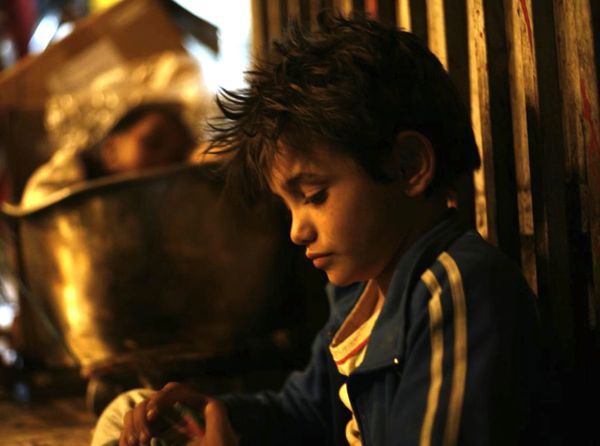Eye For Film >> Movies >> Capernaum (2018) Film Review
Capernaum
Reviewed by: Anne-Katrin Titze

A brother and sister plot to go out into the world on their own because their poor family cannot take care of them. A young girl is handed over to a much older man in marriage and doesn't survive. A woman's hair is cut off after she escapes a household that felt like prison. She has a baby in precarious circumstances. A man offers her the means to survive if she gives him the baby, her firstborn.
These are not only the scenarios for Hansel and Gretel, Bluebeard, Rapunzel, and Rumpelstiltskin, but the concrete circumstances of impoverished refugee children in Lebanon that Nadine Labaki depicts in her powerful fictional, yet painfully close to real, Capernaum (Capharnaüm). Named after the town by the Sea of Galilee which was cursed by Jesus, the film's chaos and biblical Hell on Earth is experienced by a young boy - probably 12 years old, his parents didn't bother to remember his birthdate - named Zain (Zain al Rafeea).

Intercut between scenes of his life on the streets are scenes in a courtroom, because Zain decides to sue his parents (Fadi Youssef and Kawthar al Haddad) for bringing him into the world to neglect him and his siblings. The film (Cannes Film Festival winner of the Ecumenical and Jury Prize, and the Prix de la Citoyenneté) is urgent and Labaki has found remarkable, charismatic children to play the roles. Still, and despite the obvious hardships, you might find yourself laughing with them in moments when they discover their own imaginative ways to navigate the cruel absurdities the adults created for them.
There is the anti-superhero Cockroach Man (Joseph Jimbazian) at a rundown amusement park, who, as fate wants it, leads Zain to the place where he encounters Rahil (Yordanos Shiferaw), a refugee from Ethiopia, and, hidden away, her baby Yonas (Boluwatife Treasure Bankole). Zain left his parents and numerous siblings after his beloved little sister Sahar (Haita 'Cedra' Izam), eleven years old, was married off against her will.
Little Zain and even littler baby Yonas end up being thrown together to fend for themselves in a world full of chaos and violence, where decency is a sheer impossible luxury and the outlook of the smallest profit determines most grown-ups' behaviours.
Fairy tales function best when beauty and horror inform each other and they are ultimately optimistic, telling us that change is possible if only we care enough and open our eyes. Capernaum shares a lot of this logic. The slums of Beirut, filmed from above (by cinematographer Christopher Aoun), can resemble an intricate painting, with the tires that hold makeshift roofs in place, as ornaments.
You might notice the elegance of composition while knowing that the place contains so much human suffering. And this precisely is the point. Labaki uses a number of approaches to get to our conscience and consciousness: Is this treatment of children, the film seems to ask, the legacy of our times that you want future generations to see?
Joan Didion's description of a baby crawling around in between its parents' drug paraphernalia in her book The White Album may come to mind when we see the crying toddler, chained to furniture in the ramshackle apartment Zain's family lives in.
In a similar way to the films of the Dardenne brothers, who do not shy away to tell tales of fathers selling their babies, abandoned kids, and deep moral dilemmas, Capernaum is not set in the long ago and far away. Lives can still be altered. The countless refugee children without papers, who never went to school and for whom every day is about survival are our reality in 2018 and their stories need to be heard.
Capernaum is Lebanon's Oscar submission for the 91st Academy Awards. Ziad Doueiri's The Insult, from Lebanon, was shortlisted for the 90th Academy Awards Oscar.
Reviewed on: 16 Dec 2018
















